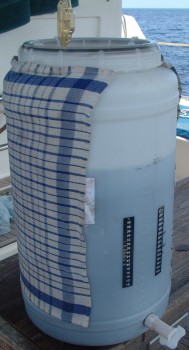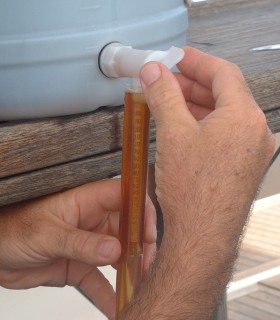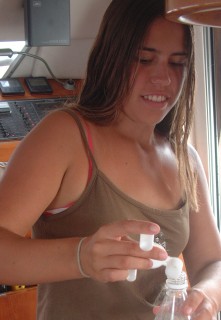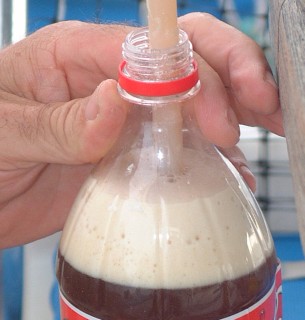
Carboy cooling with wet cloths
Coopers Bitter #2
 Carboy cooling with wet cloths |
OK, we're currently motoring along through Indonesia, off the north coast of Flores Island. There's very little wind along this coast so we've been motoring more than we like, but one side benefit is that we have lots of electricity and therefore lots of pure, fresh-squeezed water. We're also running through our delicious Australian Pale Ale fairly quickly, so it's time to do another brew before we run out of our Draught as well (horror of horrors!). Finally, today is Indonesian Independence day (1945, from the Dutch) so it seems particularly appropriate to do something special.
I was able to stock up on several brew-kits before we left Darwin, but some of them ripped through a shopping bag and fell before we could get them stowed properly. We labeled these 3 dented cans as "use first", which gave us a choice of Bavarian Lager, Real Ale, or Bitter. Since our recent beers have been fairly light, and because our first Bitter (now just a fond memory) is still our favorite brew, we decided to do another Coopers Bitter.
Thursday, 17 August 2006 - Preparation:
This is getting fairly standard now - assemble the bits (including 2 large
spoons), wash them and the carboy in brewers detergent, rinse thoroughly, then
disinfect everything in sodium metabisulfite. The only changes I made this
time was giving everything a bit better scrubbing, disassembling the valve (I
didn't know I could), and soaking everything in the sodium metabisulfite for
~40 minutes. I also rinsed everything 5 times, just to make sure...
 Taking a specific gravity measurement sample |
Thursday, 17 August 2006 - Coopers Bitter (again):
Although our first Bitter
was delicious, I can't resist making small
modifications to see if I can make it even better. In this case, my main
procedural change was to use 1kg of dextrose-malt-maltodextrin mix (Coopers
Brew-Enhancer #2) instead of the dextrose-maltodextrin mix as I'd used before.
I'd like to evolve towards more malt and less dextrose, if possible.
My procedure was much like before - add a few inches of cool water to the bottom of the carboy, put in the sugars and the Bitter brew-kit, add a few inches of hot water to the brew-kit can to dissolve out the last of the kit, and then fill the carboy slowly with tap-water. I added the water down the side of the carboy to minimize bubbles forming, and stirred continuously until I had 23 liters of wort. Because the day is hot, I also added ~1 liter of fridge-water. I took an initial specific gravity measurement (1.042, fairly high), added the yeast on top, screwed on the top, and popped in the water-trap.
|
One problem, once again, is temperature. Optimum brewing temperature for the wort is 70°-80°F (21°-27°C) but it will actually tolerate temperatures as high as 90°F (32°C). Daytime air temperatures are currently ~87°F (30.6°C) and my water temperature is only slightly cooler than that, but the fermentation process is exothermic (generates its own heat). So I'm keeping the carboy in the breeze when I can and wrapping it in wet towels to cool it as much as I can, but I expect fermentation to go off pretty quickly.
Thursday, 17 August 2006 - Fermenting:
As expected, fermentation started early - before the sun had even gone down.
The evenings have been cool enough in Indonesia that I left the carboy out in
the cockpit to try to
cool it down. During the day I put it in the shade - down below if it was
calm or in the cockpit (and draped in wet cloth) if there was a breeze.
Unfortunately, I couldn't really cool the wort enough to slow the fermentation
process down significantly. After 2 days bubbling had largely stopped,
unless we disturbed the carboy.
 Amanda priming the bottles |
Tuesday, 22 August 2006 - Bottling:
I've long worried about doing the preparation phase of bottling while on Ocelot
- it just takes so much water to properly clean all the bottles. However,
today there's almost no wind so we're having to motor-sail along the north coast
of Flores Island anyway, so I can run both pumps on the watermaker for as long
as I need to. In the end, I found that most of the water could be recycled
for other cleaning purposes anyway. So while a lot of water was pumped
from the tanks, perhaps only 5 gallons (20L) were completely "consumed".
I first rinsed out 20 1.25 liter bottles in hot water. They were already nominally clean, but some still had some water left in them. I then mixed up a strong batch of sodium metabisulfite and poured it from one bottle to the next, shaking each bottle to coat the inside in the sterilizing solution. After leaving the bottles to sit for about 40 minutes they were all rinsed out 3 times to remove all traces of the sodium metabisulfite.
 This Bitter produced a great head while bottling |
The final specific gravity was my lowest yet, at 1.006. Given that my initial specific gravity was also my highest yet (1.042) I expect a net alcoholic content of about:
((1042-1006)/7.46) + .5 or about 5.3%, my highest yet.
Bottling itself went quickly. I again decided to charge each 1.25 liter bottle with enough priming sugar for 1.5 liters, in order to increase my carbonation. My previous Bitter didn't really need this, as the last few bottles were very nicely carbonated, but this is my current regimen.
Bottling yielded 17.5 1.25 liter bottles, for a total of almost 22 liters of Bitter - a good harvest! More importantly, the Bitter produced an excellent head during the bottling phase, thick and rich and creamy. This is a pain to deal with while bottling (I have to wait for the head to go down and then top-up each bottle) but hopefully it's an indicator of good things to come.
February 2007 - Tasting:
I had high hopes for this Bitter - after all, my
last Bitter is still my favorite beer to
date. Unfortunately, my decision to use Coopers Brew Enhancer #2, a
dextrose-malt-maltodextrin mix of sugars, produced an overly malty
taste to this Bitter. Perhaps someone with a more educated palate may have
enjoyed it, but it wasn't . It was OK, I suppose, but not nearly as good
as I had hoped and I was glad to move on to our Bavarian Lager when this batch
of Bitter was finished.
Lessons learned: Follow the recipe and don't mess with success!
Brewing Pages:
Jon's Pages:
Top Level: Home | Destinations | Cruising Info | Underwater | Boat Guests | Ocelot | Sue | Jon | Amanda | Chris | Site Map | Make a Comment
|
If our information is useful, you can help by making a donation |
Copyright © 2000‑ Contact: Jon and Sue Hacking -- HackingFamily.com, svOcelot.com. All rights reserved.